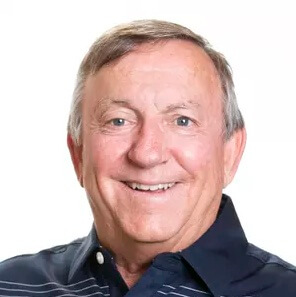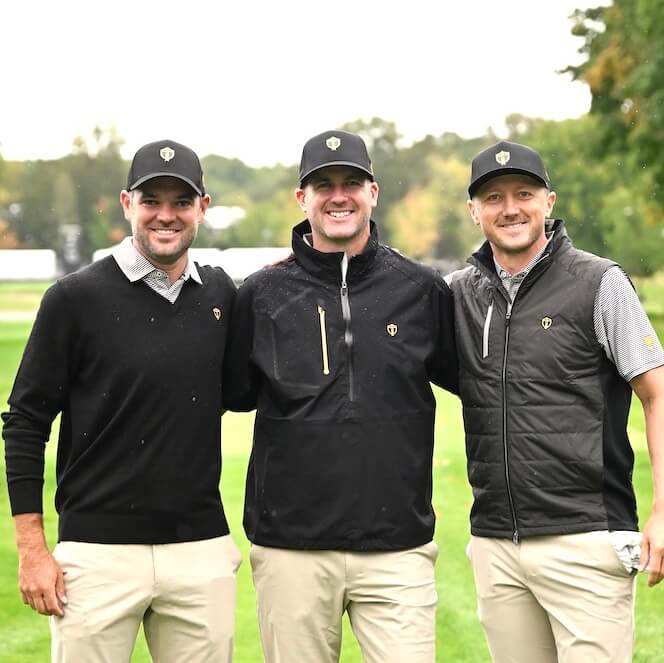Herb Page, the legendary retired men’s golf coach at Kent State University, confesses to his own sarcasm before dispensing it.
He is on the phone from the golf course in Ohio, talking about the Presidents Cup this week and Kent State’s outsized impact on the international competition.

“The Georgia Bulldogs, they’re a college golf power and they have two players in the Presidents Cup,” Page said. “Cal Berkeley has two players. Texas has one.
“Kent State? Three … Thank you.
“People just don’t realize some time.”
Page being Page, a beloved 73-year-old dynamo, he again points out he is being sarcastic, but what he’s really doing is speaking the truth.
As the Presidents Cup arrives at Royal Montreal Golf Club in Canada, the Americans are in their usual role as favorites, but the International team seems to have the built-in emotional advantage because of where the event is being played and who is representing the host team.
Three former Kent State and Canadian golfers – Mackenzie Hughes, Corey Conners and Taylor Pendrith – compose one quarter of the roster for captain Mike Weir (another Canadian) as the four-day event commences on Thursday.
Kent State is not some small, out-of-the-way school. It enrolls more than 25,000 students on its main campus in northeast Ohio, making it the third-largest school in the state, behind Ohio State and the University of Cincinnati. What, rather who, has helped separate Kent State golf is Page.
The Golden Flashes have a rich golf legacy, having won 28 Mid-American Conference championships while producing the three Presidents Cup representatives along with Ben Curtis, who won the 2003 Open Championship.
It was Page, a Toronto native who played golf, football and hockey at Kent State and is a member of the Canadian Golf Hall of Fame, who built the program into a consistent force in college golf. He retired after 41 years as head coach in 2019, but his impact is such that Hughes invited Page to spend Presidents Cup week with the team, which he is doing.
“I’m very proud of those young men,” Page said. “They were champions in college and climbed the ladder, and here they are at the ultimate. This is pretty special.”
The Hughes-Conners-Pendrith triumvirate finished fifth in the NCAA championship at Riviera Country Club in 2012, one of four top-10 finishes in Kent State’s 17 trips to the event in Page’s tenure.
“We got beat by Alabama in match play [in 2012] with all three of those guys on that team,” Page said. “If we knew then what we know now, they probably should have fired my ass.
“Three guys with nine wins on the PGA Tour … What kind of coach was that guy that he couldn’t win the national championship?”
Sarcasm again.
Page was the kind of coach whose impact on players has lasted well beyond the years when they were in school.
“When Herb recruited me in Ontario, he’s not a big person. He’s short – maybe 5-6, if we’re being generous – but I remember being intimidated by his presence,” Hughes said. “Some of it was wanting to impress him because I wanted to go to Kent State. He had intense drive to do well and to win and to be at the highest level. We played a really hard schedule in school.
“He cared a lot about his players. There were times I thought he was coming down a bit hard on me or one of the other guys, but I was always reminded that if he was being hard on you in any way or on your case, it meant he cared about you. He wanted the best for you, and that was his way of showing it sometimes.”
With his roots in Canada and his ability to see potential, Page succeeded by finding talent and developing it at Kent State. In Hughes’ first year at Kent State, there were five Canadians and five Americans.
Hughes was a junior when Conners and Pendrith arrived at Kent State. Pendrith and Conners started slowly as freshmen. Hughes remembers Pendrith missing several weeks due to illness in his first year and Conners, now one of the game’s most consistent ball-strikers, struggled to hit it 250 yards off the tee.
“People think we must have just dominated. It took us a while to get going. My senior year, those two were sophomores and found their groove,” Hughes said.
With his roots in Canada and his ability to see potential, Page succeeded by finding talent and developing it at Kent State. In Hughes’ first year at Kent State, there were five Canadians and five Americans.
Page wasn’t afraid to push buttons and press his players to be better, Hughes said.
“We had difficult conversations and heart-to-hearts, but looking back I know he always had my best interests at heart. I look back on the experience a little differently than when I was going through it,” Hughes said.
“I thought maybe he was being too hard, wondering what I did to deserve this, but he made us better, and he helped make us the people we are. He was the right coach for me.”
Page splits his time these days between Kent, Ohio, and Kiawah Island, South Carolina, but this week he’s in Montreal with his former players. He has unlimited access and planned to use it until the competition begins Thursday when Page intends to step outside the ropes and the team room to let his guys do what they do so well.
“I was fortunate to have these three young men not just for their golf ability but for their grit and competitiveness. They were talented, but talent isn’t everything,” Page said.
“Those three guys put me in the Canadian Golf Hall of Fame, and I thank them every day for that.”
And they are thanking Herb Page by making him a part of this week.
© 2024 Global Golf Post LLC


